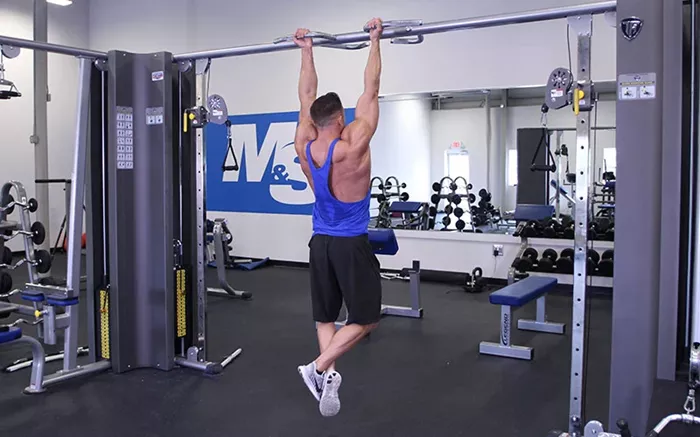A close-grip pull-up is a variation of the standard pull-up, focusing on a narrower hand position. This exercise targets the upper body, especially the back, arms, and shoulders. It’s a great compound exercise that challenges multiple muscle groups at once.
Understanding the Close-Grip Pull-Up
What Is the Close-Grip Pull-Up?
The close-grip pull-up is a bodyweight exercise that involves pulling your body upward while gripping the pull-up bar with both hands placed closer together, usually shoulder-width apart or closer. This modification changes the angle of the arms, emphasizing different muscles than the traditional wide-grip pull-up.
Why Is It Different from Regular Pull-Ups?
Unlike the regular pull-up, where the hands are spaced wide apart, the close-grip variation creates a more concentrated load on specific upper-body muscles. The narrow grip targets the biceps more effectively while still engaging the back, shoulders, and chest.
Benefits of Close-Grip Pull-Ups
1. Enhanced Biceps Engagement
By using a narrow grip, close-grip pull-ups significantly recruit the biceps. This makes them a fantastic exercise for building arm strength and muscle definition, especially when combined with other arm exercises.
2. Stronger Upper Back and Shoulders
The close-grip pull-up works the upper back muscles, such as the latissimus dorsi, rhomboids, and traps, while also engaging the rear deltoids in the shoulders. This can help improve posture and overall upper-body strength.
3. Increased Grip Strength
Because of the narrower hand positioning, the close-grip pull-up forces you to maintain a firmer grip on the bar, which can lead to improvements in grip strength over time. A stronger grip enhances performance in other exercises, like deadlifts and rows.
4. Improved Core Stability
Like all pull-ups, close-grip pull-ups engage the core muscles to stabilize the body throughout the movement. This provides an excellent way to strengthen the abdominal and lower back muscles as part of a full-body workout.
Proper Form for Close-Grip Pull-Ups
Step-by-Step Guide
To perform a close-grip pull-up correctly, follow these steps:
- Step 1: Start by standing underneath a pull-up bar. Grab the bar with your palms facing away from you, and your hands positioned closer than shoulder-width apart.
- Step 2: Engage your core and pull your shoulders down away from your ears.
- Step 3: Hang from the bar with your arms fully extended and your legs slightly bent or crossed at the ankles to avoid swinging.
- Step 4: Pull your chin up toward the bar by driving your elbows down and back. Focus on using your back and arms to lift your body.
- Step 5: Slowly lower your body back to the starting position, keeping control of the descent to maximize muscle activation.
Common Mistakes to Avoid
To ensure the exercise is effective and safe, avoid the following mistakes:
- Overextending the arms: Do not let your arms lock out at the bottom of the movement. Keep a slight bend in your elbows to maintain tension on the muscles.
- Excessive swinging: Keep your body as still as possible to prevent using momentum. Engage your core to prevent swinging.
- Incorrect grip: Ensure your hands are placed correctly on the bar—too wide or too narrow will affect the effectiveness of the exercise.
Close-Grip Pull-Up Variations
1. Assisted Close-Grip Pull-Ups
If you’re unable to perform a full close-grip pull-up, use resistance bands or an assisted pull-up machine to reduce the amount of body weight you have to lift. Gradually decrease assistance over time as your strength improves.
2. Close-Grip Chin-Ups
Another variation of the close-grip pull-up is the close-grip chin-up. This version involves a supine grip (palms facing you), which places greater emphasis on the biceps while still working the back muscles.
3. Close-Grip Negative Pull-Ups
If you’re working to build strength for full pull-ups, negative close-grip pull-ups can help. Jump or step up to the top of the pull-up position, then slowly lower yourself down as slowly as possible. This eccentric movement helps increase strength over time.
Incorporating Close-Grip Pull-Ups into Your Workout
Training Frequency
For most individuals, performing close-grip pull-ups 2–3 times per week is ideal for building strength and endurance. Ensure you give your muscles sufficient time to recover between sessions.
Combining with Other Exercises
Close-grip pull-ups can be paired with other bodyweight exercises, like push-ups, dips, and bodyweight rows, to target the upper body comprehensively. Alternatively, combine them with exercises from your anaerobic training regimen, like anaerobic exercise at home, to challenge your muscles further.
Progressing with Close-Grip Pull-Ups
Track Your Progress
As with any exercise, tracking your progress is key to improvement. Keep a workout log and record the number of pull-ups you can perform in each session. As you get stronger, aim to increase your reps or decrease the assistance you use.
Combining Close-Grip Pull-Ups with Cardio
While close-grip pull-ups primarily focus on strength training, incorporating cardio exercises into your routine will improve overall fitness and endurance. Alternate between strength training days and cardio days for a balanced regimen.
Conclusion
The close-grip pull-up is a powerful exercise for building upper body strength and improving muscle endurance. By properly executing this move and integrating it into a balanced workout program, you can see substantial improvements in strength, grip, and overall fitness. Remember to focus on form, gradually increase intensity, and complement your routine with other exercises for the best results.

